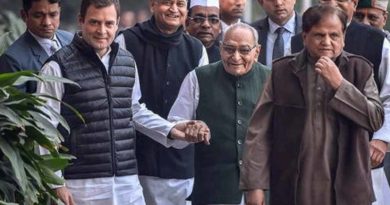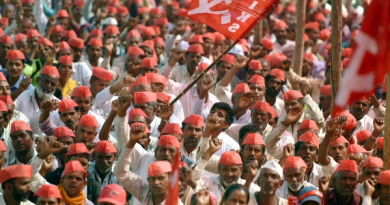Corrupt And Poor, Yet India Can Become The Best Democracy

Dilip Chakrabarti
After India became free from the subjugation of Britain in 1947, a big change came into Indian Political and Social life. Many waves of celebrations started to flow, People became overwhelmed with this reality of freedom, celebrations often crossed the limit of civility, the union government headed by Nehru took over the administration of the country. The division of the country was not taken well and a riot between Hindus and Muslims broke out in different parts of India and Pakistan killing many Hindus and Muslims in both countries. However, after many appeals to people the riot stopped and people started to realize the value of freedom which was gained after so many decades of struggle. Finally, the commotion started to fade away, and people started to celebrate overwhelmingly all over the country. Leaders of the Congress party formed the Government to run the country. After forming the government, the leaders realized that the country should have a constitution which will ensure the welfare of the people of the country. To fulfil this goal a committee was formed to draft the Constitution of Free India for the people of India.
On August 29, 1947, officially a drafting Committee of Indian Constitution was formed with seven members. The head of the Committee was Dr. Bhimrao Ramji Ambedkar. The other members were Alladi Krishnaswami Ayyar, N. Gopalaswami; B.R., K.M Munshi, Mohammad Saadulla, B.L. Mitter and D.P. Khaitan.
24 January 1950: Last meeting of Constituent Assembly. The Constitution was signed and accepted (with 395 Articles, 8 Schedules, and 22 Parts). 26 January 1950: The Constitution came into force. (The process took 2 years, 11 months and 18 days—at a total expenditure of ₹6.4 million to finish.)
The Preamble of the Constitution of India presents the principles of the Constitution and indicates the sources of its authority.[1] It was adopted on 26 November 1949 by the Constituent Assembly and came into effect on 26 January 1950, celebrated as the Republic Day of India. It was amended during Indian emergency by Indira Gandhi where the words “socialist” and “secular” were added in 1975 during emergency.
WE, THE PEOPLE OF INDIA having solemnly resolved to constitute India into a SOVEREIGN SOCIALIST SECULAR DEMOCRATIC REPUBLIC and to secure to all its citizens:
JUSTICE, social, economic, and political;
LIBERTY of thought, expression, belief, faith and worship;
EQUALITY of status and of opportunity; and to promote among them all
FRATERNITY assuring the dignity of the individual and the unity and integrity of the Nation;
IN OUR CONSTITUENT ASSEMBLY this twenty-sixth day of November, 1949, do HEREBY ADOPT, ENACT AND GIVE TO OURSELVES THIS CONSTITUTION.
However, the Supreme Court of India originally determined in the Berubari case presidential reference[8] that the preamble is not an integral part of the Indian constitution, and therefore it is not enforceable in a court of law. Again, the same court, in the 1973 Kesavananda case, over-ruled earlier decisions and recognized that the preamble may be used to interpret ambiguous areas of the constitution where differing interpretations present themselves. In the 1995 case of Union Government vs LIC of India, the Supreme Court once again held that the Preamble is an integral part of the Constitution.
The constitution of India assures the equal rights for its citizens yet it has provided special reservations based on caste, tribe and religion to its citizens thereby creating a different class and has labeled them as minority. Although the constitution guarantees the separation of state and religion, yet it caters to the Islamic religion with a different rule of thoughts to please the Muslim population.
Article 27 of the constitution prohibits using tax-payers money for the promotion of any religion.
Often states sponsor and grant money to Madrasas where religious teachings are given priority to other educational fields like science etc. while regular schools never receive any grant or money to promote Hinduism or any other religion. Thus, the secularism as practiced in India shows marked differences with western practice of secularism and it is a very controversial topic in India. Supporters of the Indian concept of secularism claim it respects “minorities and pluralism”, in reality does it do it?
Article 164 of the Constitution deals with appointment of Chief Minister and other ministers. It reads as follows:
Article 164. Other provisions as to Ministers. (1) The Chief Minister shall be appointed by the Governor and the other Ministers shall be appointed by the Governor on the advice of the Chief Minister, and the Ministers shall hold office during the pleasure of the Governor.
It is worth mentioning here that the people who drafted the constitution were too honest, too dedicated, and too idealistic to imagine that someday these elected representatives of Parliament or State House could become greedy for avarice and commit crimes against the people for whom they vowed to serve. Probably that is why we do not see any clear clause that would punish the corrupt the members of the Legislature. Hence many of these corrupt members get elected and comes back through the revolving doors of election without being punished. This way the exploitation of the country is going on since the early seventies.
Also, Article 164(4) provides as follows: “A Minister who for any period of six consecutive months is not a member of the Legislature of the State shall at the expiration of that period cease to be a Minister.” This clause was taken originally from Section 10(2) of Government Act, 1935.
It is often a matter of pride for Indians that India is the largest democracy in the world. But the largest democracy has not become the best democracy in the world. Because the ruling party often decides not to punish the corrupt elected members of the Legislature of the state or the Member of the Parliament. These crooked members of both houses always find new ways to loot from the country yet they are never punished by the court of the law. It is not found in any western democracy, yes, if there are some isolated cases of allegation of misappropriation of public fund, the investigation is done quickly and if found guilty, they are put in jail immediately. For example, some of the names from USA are Rep Dan Rostenkowski, Governor Blagojevich, etc. Prime Minister François Charles Armand Fillon of France was tried for defrauding and misuse of funds and was sentenced to jail for five years. Great Britain has ousted numerous MPs and Ministers even after sexual accusations. Before the recent passage of the act there were no mechanisms to recall Members of Parliament (MPs) in the UK. The Representation of the People Act 1981 disqualifies any person in jail for more than a year from being an MP, and thus automatically expels an MP from the elected office.
But it is a shocking to see any democracy that 43% of its elected MPs have criminal records attached to their names, while 49% of MLAs have criminal records in West Bengal Assembly and the government is not doing anything to stop these criminals. All these criminal activities include serious crimes like murder, rape, robbery, cheating, extortion etc. These elected criminals never get any punishment, because corrupt police do not prosecute the case properly, the judicial system is too slow, and as a result the victims hardly get any justice from the court of the law. The slow Judicial System lets these elected members to continue the minacious deluge of criminal activities against the State or Country. As a result, the amelioration suffers, wangling wins over honesty depriving the country and its people, and its only beneficiary the crooked elected members of the country.
Democracy of India is the largest, but can this be the best in the world? The answer is yes of course, it can become the best, only if our Union Government take a few extra steps.
Article 164(4) must be amended to make sure that nobody should be allowed to become or remain a minister if that person is defeated in the preceding election. When a candidate is defeated in election, this means that people has rejected him and he should not get an entry through the door of article 164(4). Under the circumstance, the Constitution must be amended to stop this type of happening again in any state of our beloved country.
Often MPs or MLAs are bought to get a majority to form a government like recent example Maharastra, Bihar or Manipur etc. These “Kenaram” and “Becharam” MLAs or MPs create a huge problem for the voters because they ignore the mandate of the voters and switch Parties often to benefit their own political or financial agenda and the voters are left often without any choice but to swallow their crossover of party lines. Changing the law that nobody can contest an election if he or she is accused of any crime which is pending for more than a year in the court of law. Create a special judicial system to solve the cases and stop these accused criminals from contesting any election in the country.
To achieve this a few things, need to be done in state and central level. Any crossover of political party by an elected official, must follow the expulsion from the elected office or the elected official must resign from the elected office before doing any change of political party and only comeback after winning a fresh new election. By this process, the influence of Ayaram or Gayaram will stop altogether. Often MPs or MLAs are paid hefty amount of money to obtain his support to a form a government, this crossover of party line must be made illegal and the MLA or MP involved must be ejected from the house of representatives immediately.
The recent example of corruption in the State of West Bengal, a unique way of stealing jobs from qualified candidates in the Education Department of West Bengal, this has opened the eyes of common people how a system of corruption was established by the TMC Government. This became so rampantly corrupt that it paved the way for the whole education department heads to the jail. This consorted effort of the TMC Government virtually put the education system in risk of total destruction. Instead of investigating and punishing the culprits the TMC Government has consistently tried to legalize it and protect the criminals who have done it. As a result, hundreds of legitimately qualified teachers are not employed and the students are getting a lower level of education or no education at all. This is a crime because right to education is one of the fundamental rights attributed to our children by the Constitutions of India. TMC Government Chief Minister Mamata Banerjee should be held liable for violating the constitution of India because everything happened under her watch and support.
The best way to clean this political corruption is not to elect these corrupt politicians. To achieve this the Election Commission should take clear and decisive step to implement a free and just electoral system. The Election Commission must establish a strong electoral system (if necessary, backed by Central Force) where any goon of any political party cannot take over the Polling Booth and put stamps on the ballot papers in favor of their political party’s candidate. The voters must be allowed to vote for any candidate of choice.
In a commonsense approach, if a plebiscite is taken for these issues, I am sure, the commonsense of the citizens will prevail and one of the deepest root causes of corruption will be eradicated once and for all. Pic courtesy : You Tube



